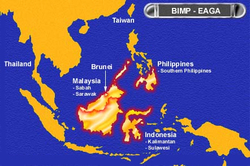Sun Star | 8 March 2016
100,000 hectares eyed for hybrid rice production
by ACE JUNE RELL S. PEREZ
THE country's agribusiness cluster of the Brunei Darussalam-Indonesia-Malaysia-Philippines East Asean Growth Area (BIMP-Eaga) is targeting a total of 100,000 hectares for expansion of hybrid rice production area in the sub-economic region.
This will be undertaken by the SL Agritech Corporation (SLAC), a subsidiary of Sterling Paper Group of Companies.
The target was being discussed and highlighted by the BIMP-Eaga Agribusiness cluster during the recently-concluded Strategic Planning Meeting (SPM) 2016 hosted by Davao City last month.
“The SL Agritech is currently in the process of exploring available and potential areas for expansion of the hybrid rice production especially in Mindanao,” Romeo Montenegro, director for investment promotions and public affairs of Mindanao Development Authority (Minda) and the Philippines National Secretariat Alternate head said.
He added that the plan has to be understood by everyone as the undertaking is not for rice for production but for seeds for propagation.
“Awareness and proper education for this expansion is important, because if we implement this now on a rice land that are designed for producing, practically they will not allow any of these expansion, we need to inform them that hybrid rice production is not for food production but its purpose is to produce more seeds that will be propagated by the Philippines and the rest of the BIMP-Eaga,” Montenegro said.
Based on the SLAC website, the company is performing research work on hybrid rice varieties suitable to tropical conditions prevalent in the Philippines. The company’s primary purpose is promoting the development, commercialization and growth of hybrid rice technology.
Grown in the choicest farmlands and having the best rice breeding technology in the Philippines, SLAC ensures the quality and benefits of its rice. SLAC has been certified with the ISO 9001:2000 for Hybrid Seeds and Hybrid Rice Production last February 2009.
Meanwhile, the Philippines is set to pioneer hybrid rice farming in Malaysia next month thru SLAC. For the initial pilot testing, the local hybrid rice and seeds producer will ship out a minimum of 100 kilos of seeds where quarantine processes are already being arranged.
In a report, “the pilot testing will be spearheaded by a private Malaysian company, Titijaya Land Berhad (TLB), in partnership with the Malaysian government through agricultural state research agency Malaysian Agricultural Research and Development Institute (Mardi).”
Meanwhile, the agribusiness cluster also agreed to construct and install more coco coir processing centers in the sub-economic region starting this year.
The coco coir processing center in Caraga, Davao Oriental was already established and completed costing some $80,000.
The agribusiness cluster envisions a sustainable, competitive and climate-resilient BIMP-Eaga agro-industry and fisheries.














